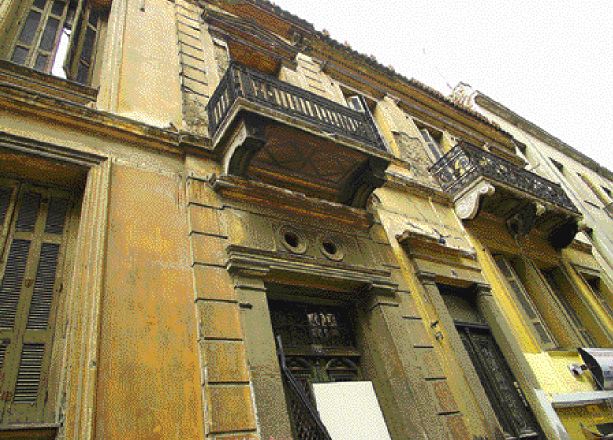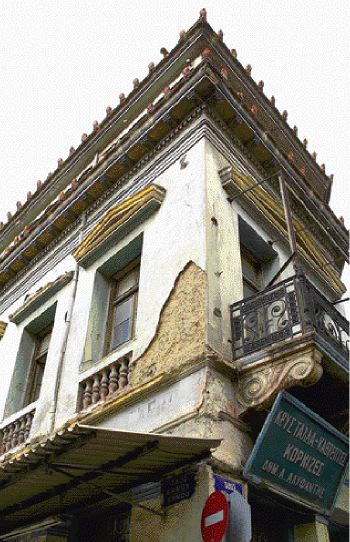 |
||
|
Joining the Rush to Renovate
By Maria Kagkelidou |
||
|
Older traditional properties, long ignored by Greek buyers, are now being snapped up in record time. However, there are still plenty of opportunities to take on a renovation project and see it through to great returns Until recently, Greek buyers were shockingly indifferent to older properties, preferring to sink their money into brand new buildings. However, in the last decade a new generation of buyers has turned its sights to the renovation market with spectacular results. Today, traditional homes in need of renovation are selling like hot cakes in cities, towns and holiday destinations throughout the country. In a booming market, prices for homes with a history have risen much faster than the market average, and upon selling them on, you are looking at hefty returns. A three-bedroom apartment in a central Athens |
 |
|
| neoclassical building in need of moderate renovation retails for around $300,000. But upon completing all necessary works you would be looking at a selling price of at least half a million. Kitsa Athanasiadou is a civil engineer specialising in renovation projects. She advises her customers to buy as derelict a building as they possibly can. "The renovation itself is a straightforward process. But I would say on average the cost works out to $1,500-2,000 per square metre for a building in need of a complete overhaul, so I advise my clients to buy as cheap a property as possible," she explains. The search Before setting off to find a property to renovate take a good look at your finances and what you can afford to spend, as renovation projects are notorious for shooting over budget. "It is hard to know what lies behind a painted wall and what necessary works will appear in the course of the renovation," says Athanasiadou. "This is why engineers are reluctant to give exact cost figures and, if they do, they are always on the high side." Greece's culture ministry, which owns a host of historic buildings and has a number of relevant experts in its employ, allows for a 30 percent deviation from its original renovation budget. |
||
| Visit the property you have in mind with a qualified architect or engineer. They can advise you on costs and will be able to determine whether what you have in mind for the property is feasible and legal. Greece lies in an earthquake zone and employing an expert to oversee major renovation works is absolutely necessary for safety as well your financial well-being. Make sure he or she has been recommended by someone you trust, take a look at other examples of their work and make sure you are very clear about what they plan to do to the property before allowing them to work on your dream home. "Until recently, many architects and engineers in Greece used the word renovation to mean simply keeping the facade of a building," says Athanasiadou. "They did away with the rest and built from scratch. Only in the last few years has this practice been abandoned. Such a technique also poses serious questions about the safety and stability of a building in case of an earthquake." |
 |
|
|
Any grand designs you might have for your renovation project depend on its legal status. Many older buildings in Greece have been listed for preservation by the environment and culture ministries. Properties listed with the ministry of culture tend to be older - up to and including 19th-century homes - and very strictly protected, but you are allowed considerably more leeway with properties listed in the environment ministry register. You can check whether the property you are after is listed with either ministry at the local antiquities office. Getting planning permission to renovate listed properties is a lengthy process - architects and engineers estimate that it might take anything up to four months for extensive renovation works - while you are required by law to maintain or even reconstruct original features. Such conservation and reconstruction works usually require the help of an expert and don't come cheap. For example, renovating or reconstructing ceiling paintings in a 19th-century property might cost anything between 170 euro and 300 euro per square metre. But renovation and construction restrictions don't just apply to listed buildings. Even though in many parts of Greece relative anarchy reigns when it comes to building materials and aesthetics, in others, such as the Cyclades, Mount Pelion and Zagorochoria, the local planning offices enforce strict construction rules. Traditional materials have to be used where possible for building and renovation work while colour schemes, fixtures and fittings may also be tightly controlled. For example, throughout the Cyclades homes must be painted white, while for doors and shutters you can take your pick between blue, green, grey and red/brown depending on the island and its own architectural peculiarities. Shortcuts and other pitfalls The problem you are most likely to face when trying to buy any older property in Greece is that of multiple owners. Homes are traditionally passed down in equal shares to the owner's descendants and it is not uncommon to view a home and come to an agreement with the self-proclaimed owner only to discover you must track down and convince another handful of individuals before you can actually go through with the purchase. Unfortunately, there is no way to guard against such an eventuality, apart from getting friendly with your future neighbours and finding out as much as you can about the property before committing yourself to it. A more common and easily avoidable problem is that of delays and soaring costs. Hard as it is to put a final figure on renovation costs, if you decide to employ an expert to oversee the project, you should come to a formal agreement regarding your maximum outlay and the time it will take to complete all works. This agreement should form part of your contract with them and stipulate financial and other penalties should the expert not keep to his or her part of the deal. However, you must also remember that, even though bending the rules is common in Greece, if you allow you project manager to do so with your property, it will be very hard for you to enforce the terms of your contract with them. Unfortunately, there are hardly any schemes to part-fund the renovation of listed and traditional properties in Greece. In the city of Athens you could possibly apply for a loan with beneficial terms to do up the front of your building, but apart from that, would-be renovators have to cover all costs themselves. The only substantial funding initiative operating throughout the country is a European programme called Leader. It allocates grants to renovate older properties in traditional settlements but only if their owners plan to use them commercially upon completion. Contact information * TEE, Greece's Technical Chamber, can provide a list of qualified architects and engineers in your area. See www.tee.gr * The Culture Ministry's regional service links can provide the contact details of your local archaeological authorities at www.culture.gr * Kitsa Athanasiadou, civil engineer, 210 677 3757 * Babis Kotsailidis, architect, vtwins@ath.forthnet.gr * You can find information about the city of Athens loans programme at www.prosopsi.gr |
||
(Posting date 1 September 2006) HCS readers can view other excellent articles by the Athens News writers and staff in many sections of our extensive, permanent archives, especially our News & Issues, Travel in Greece, Business, and Food, Recipes & Garden sections at the URL http://www.helleniccomserve.com./contents.html
All articles of Athens News appearing on HCS have been reprinted with permission. |
||
|
||
|
2000 © Hellenic Communication Service, L.L.C. All Rights Reserved. http://www.HellenicComServe.com |
||

